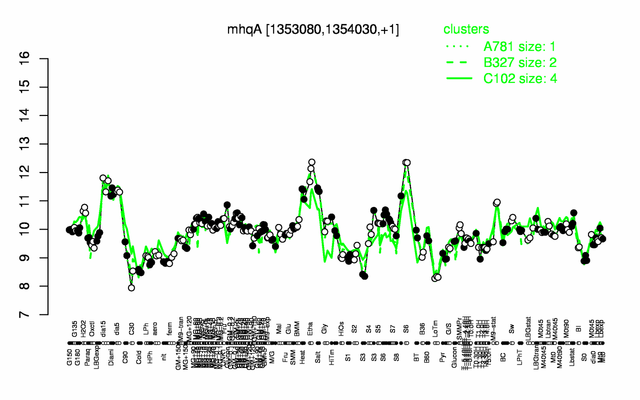MhqA
(Redirected from YkcA)
- Description: hydroquinone-specific dioxygenase, confers resistence to methyl-hydroxyquinone
| Gene name | mhqA |
| Synonyms | ykcA |
| Essential | no |
| Product | hydroquinone-specific dioxygenase |
| Function | resistence to methyl-hydroxyquinone |
| Gene expression levels in SubtiExpress: mhqA | |
| MW, pI | 35 kDa, 5.404 |
| Gene length, protein length | 948 bp, 316 aa |
| Immediate neighbours | steT, ykcB |
| Sequences | Protein DNA DNA_with_flanks |
Genetic context 
This image was kindly provided by SubtiList
| |
Expression at a glance PubMed
| |
Contents
Categories containing this gene/protein
resistance against oxidative and electrophile stress
This gene is a member of the following regulons
The gene
Basic information
- Locus tag: BSU12870
Phenotypes of a mutant
Database entries
- BsubCyc: BSU12870
- DBTBS entry: [1]
- SubtiList entry: [2]
Additional information
The protein
Basic information/ Evolution
- Catalyzed reaction/ biological activity:
- Protein family: extradiol ring-cleavage dioxygenase family (according to UniProt)
Extended information on the protein
- Kinetic information:
- Domains:
- Modification:
- Cofactor(s):
- Effectors of protein activity:
- Localization: cytoplasm (according to Swiss-Prot)
Database entries
- BsubCyc: BSU12870
- UniProt: O34689
- KEGG entry: [3]
- E.C. number:
Additional information
Expression and regulation
- Operon: mhqA PubMed
- Additional information:
- number of protein molecules per cell (minimal medium with glucose and ammonium): 183 PubMed
Biological materials
- Mutant:
- Expression vector:
- lacZ fusion:
- GFP fusion:
- two-hybrid system:
- Antibody:
Labs working on this gene/protein
Your additional remarks
References